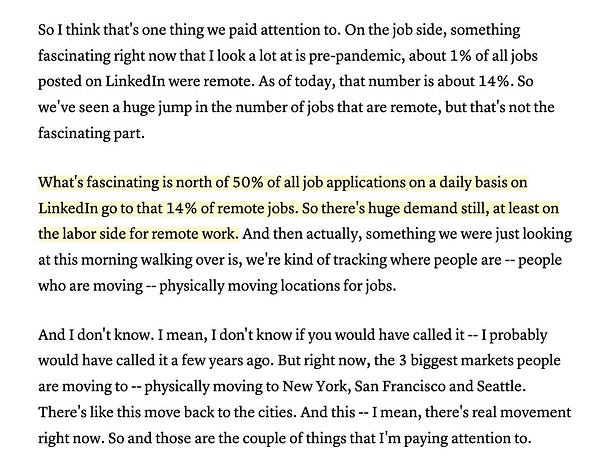In this episode, we discuss the signs of slow down in spending, the darkening outlook for companies, and the impact ChatGPT is having.
The episode is based on yesterday's newsletter which is available on Substack.
A transcript of this podcast, with relevant images and quotes, is available for all subscribers only after the show notes below. Our podcast is available on Apple Podcasts, Spotify, Google Podcasts, YouTube, and Amazon Music.
Show Notes
00:00:00 Introduction
00:00:08 There is a Slowdown
00:02:28 Companies Prepping for a Hurricane
00:04:26 The 2% Trend
00:06:11 IT Budgets Under Pressure
00:08:04 The ChatGPT Moment
00:11:07 Conclusion
Transcript
Introduction
[00:00:00] Scott: Welcome everyone to a new episode of The Transcript podcast. You've got me, Scott Krisiloff, I'm editor of The Transcript, along with Erick Mokaya who's our lead author.
There is a Slowdown
We sent out a new issue of the newsletter yesterday and it was a pretty important one in that for the last few weeks we've been seeing signs of slowing and cooling off in the economy. In this newsletter, we really started to see signs that it was confirmed that the slowdown is happening. We titled this week's ‘No Question About It’ because that's exactly what Wells Fargo's CEO said at the Goldman Sachs Financial Services conference. He said, there is a slowdown happening. There's no question about it. And so we've been following this again for the last few weeks. And one of the things that was missing was that financial services companies were saying in credit card data, they were still seeing strength. But at this Goldman Sachs financial conference, it sounded pretty bearish from a lot of these financial services CEOs, some of the biggest institutions in the country about the actual on-the-ground data. Erick, any thoughts?
"There is a slowdown happening. There's no question about it. When you watch CNBC and Bloomberg and read the newspapers, it can be a little bit confusing because the slowdown across industries. When we look at our own consumer spend information and we talk to the companies that we bank, there are some that are doing quite well, and there are some that are struggling more -- Net-net-net, the growth is shrinking that we've seen in card, albeit there's still growth. Debit card spend is about flat with transactions being down a little bit, offset by inflation” - Wells Fargo (WFC 0.00%↑) CEO Charles Scharf
Source: BlackRock
[00:00:57] Mokaya: Yeah, I agree. I mean we've spent a lot of time in the past two weeks now with the conferences especially, I think they're over now for the year. So the feeling you get as we draw to a close for this year, now going to next year, the consumers have spent quite a bit of money. They're slowing down, they're being very selective in terms of what items they buy now, and they're looking into next year sensing there's a recession coming, so they're slowing down a bit of their spending to be able to deal with that if it comes. So I think my best quote was from Bank of America CEO, who said is the spending slowdown good or bad? But then he talks about being half full and half empty, so I don't know what to expect given now, at least from our data and we seem to be ahead of the Fed in terms of data, so we can confirm that there's a slowdown happening. So is this substantial enough to make the Fed move? I think that's the next question that we'd love to ask. Any thoughts on that?
“That depends, glass half full, half empty. Half full is consumers are still in the game, half empty is they're starting to slow it down. Half full again would be the Feds had an impact they want, so they should be starting to think about whether they need to go, how much they need to go." - Bank of America (BAC 0.00%↑) CEO Brian Moynihan
[00:01:49] Scott: Yeah, I think it's gonna take a little bit of time probably to digest this change and see how it'll impact Fed policy. I think one of the things we noted in the newsletter is that labor markets still appear tight, and that's going to be the indicator of the economy that the Fed is watching most closely. So if labor markets are still tight, the Fed is probably going to be biased towards hawkishness and so that actually is probably a source of bearishness for capital markets at least, that it indicates that the Fed could overtighten, and that's something that BlackRock talked about that there could be an overcorrection, overtightening that could impact capital markets still. And this is something that I think we're all watching.
Companies Prepping for a Hurricane
[00:02:28] Mokaya: Yeah, so I think on that note then, like it feels as we end the year now, we are at this point where the Fed's action from now on matters very critically on what they're going to do. So if they keep tightening, they may actually impact the markets a lot more than as BlackRock says as is priced in right now. So I think we are at a delicate stage in the markets and I can't wait for 2023 to see where everything goes. But I think a good step is the Fed this week, maybe stepping down from 75 basis points to 50 basis points. I think we're at 4% in terms of the Fed rate. 50 basis points we get at 4.5% still way below inflation, which is still around 7%. CPIs coming in this week or so. So I think lots of data points to check, but it seems definitely from the earnings calls of most companies are at that point where they're preparing for a hurricane Jamie Dimon style. But then again I don't know, 2023 looks like everybody is assured there will be a recession. Are you convinced that there will be a recession though?
“It’s a hurricane. Right now, it’s kind of sunny, things are doing fine, and everyone thinks the Fed can handle this. That hurricane is right out there, down the road, coming our way. We just don’t know if it’s a minor one or Superstorm Sandy or Andrew or something like that. You better brace yourself. What I said about a hurricane, I said those storm clouds could mitigate. It could be a hurricane. We simply don't know. As a risk manager, I prepare for both, but I'm not guessing which one's going to happen." - JPMorgan Chase (JPM 0.00%↑) CEO Jamie Dimon
[00:03:30] Scott: I'm actually not convinced right now, but I think the quote that you mentioned from Brian Moynihan of glass half full, half empty is really the operative one because you look at this, and on the one hand the slowdown is an indication that the Fed has done exactly what the Fed wanted to do. But on the other hand, it could just be us passing through, going from a very hot economy to a recessionary economy, and we're just at a midpoint where you don't know whether some of these numbers that we're seeing are a sign or an early symptom of further deceleration or just a normalization. And, typically it would be more of a deceleration like an increased or an additional deceleration could be the case, but, if the Fed does change the way that it's managing this and starts to severely, maybe get more dovish than hawkish then you could potentially, avoid a recession in some way. That seems a little bit lower probability here, but it is a possibility potentially.
The 2% Trend
[00:04:26] Mokaya: So a couple of points you picked up today on 2%. One was e-commerce, which is decelerating. There was incredible growth in the past few years in terms of e-commerce. So now it's coming back to 2%. I think there was Bank of America talking about 2% growth next year. Any thoughts on that?
[00:04:42] Scott: Yeah. Yeah. I think that's right. I think we pulled out in a number of different quotes numbers of two to 3% growth showing up. The most important one, or the one that struck me most was that Black Friday sales were up 3% over last year, according to both Discover Financial Services and Bank of America that they saw spending up 3%. And this is really important for a couple of reasons. One, it is that broad consumer credit card data that is slowing down. It also is an indicator in and of itself that inflation is coming down because those are nominal numbers. And a lot of the growth that we had been seeing in credit card spending in consumer spending generally had just been juiced by price increases.
"So that's the Fed's impact, the rate rise and stuff are starting to slow it down. That is more consistent with sort of a 2% growth economy if you go back and look at history. So we're sort of there. If you look at Thanksgiving, to Cyber Monday, again, a record amount spent, but up about 3%. But last year, that was up 19%. And over '19, it's up almost 25%, 30%. So the consumers are still spending more money this right now than they did last year at this time, and they're spending more money this quarter than they did last quarter, but the rate of growth is slowing." - Bank of America (BAC 0.00%↑) CEO Brian Moynihan
So if you're coming back down to a 2 or 3% rate, it implies that either pricing isn't up or you're actually saying negative real spending. I think we're probably getting to this point where you're actually starting to annualize some of the comps. The spending is slowing, it's all coming down and converging to a point where the numbers are actually showing what we've been picking up on The Transcript for a while here which is that inflationary forces are starting to come down. And we're returning to a 2-3% trend. And again, to echo what I was saying or to reiterate what I was saying earlier in the conversation, the question, is it 2 or 3% or is it gonna dip down to a negative 2 or 3% for some point in a recessionary symptom? 2 or 3% is exactly what the Fed is trying to achieve though.
IT Budgets Under Pressure
“We really had a line of sight for hitting our expectations right until the very end of the quarter. Like the last 2 weeks, we saw a couple of things. First, big picture, we saw pronounced macro headwinds, and it manifested itself in 2 ways. One was on the non-enterprise deals where we saw at the end of the quarter, we saw them push out to the tune of $15 million. And we saw sales cycles in that non-enterprise market increased 11% over the last quarter. The second place where it manifests itself is in the structure for our enterprise deals, where we saw some of the enterprise folks have staggered start dates. We've always had staggered start dates, but we saw an increase over the last quarter to the tune of about $10 million” - CrowdStrike (CRWD 0.00%↑) CFO Burt W. Podbere
[00:06:11] Mokaya: So maybe another takeaway in terms of things being under pressure was also the IT budgets, which have been a bit resilient throughout the year, so they're also getting a bit of a hit. I think one of my key takeaways was from CrowdStrike, which for the past couple of months, from the quote they saw that everything was okay, and then the last two or three weeks, they've suddenly seen companies' sales cycles being stretched and especially for they're non-enterprise markets, and now they're looking like whatever targets they'd set for this quarter, they actually may not be able to hit them. So it looks like there are a couple of companies, especially IT or tech companies. So whatever expectations the market has for them, they may actually do badly this quarter going forward. So I don't know if markets have been paying attention to that thing, but our transcripts actually depicted that couple of IT companies may have a bit of a rough time in Q4 this year which may not be priced in. So I think it's a good takeaway.
"Many homebuyers are on the sidelines, waiting for clarity on the direction of mortgage rates and the overall economy. Our net signed contracts were down 60% in units and 56% in dollars in the fourth quarter, with no discernible change nearly halfway through our first quarter." - Toll Brothers (TOL 0.00%↑) CEO Douglas Yearley
[00:07:05] Scott: Yeah. Yeah, I think the IT spending data point, the consumer big ticket item purchases coming down, some of the housing numbers we're seeing, it's all kind of echoing the same psychological footprint I think that's going on in the economy, which is more of a recessionary mindset. People actually are physically starting to pull back spending. It's starting to show up in numbers. It's starting to show up in headline numbers. Toll Brothers said that their net sign contracts were down 60% in units and 56% in dollars in the fourth quarter. That's massive. Those are huge drops that are totally consistent with a recessionary environment. Big ticket items, consumers cutting back on buying dishwashers and televisions and things like that. Those are easy things to cut back on when you're starting to tighten the way that you are spending.
And then companies tightening IT budgets. We already have seen them tighten advertising budgets. These are all things that indicate people are making decisions towards restricting spend, which would be consistent with what happens in a recession.
The ChatGPT Moment
"ChatGPT launched on Wednesday. Today it crossed 1 million users!..🙏 to my colleagues for making it feel like I get to walk into the modern bell labs every day -- Microsoft, and particularly Azure, don’t get nearly enough credit for the stuff OpenAI launches. they do an amazing amount of work to make it happen; we are deeply grateful for the partnership. they have built by far the best AI infra out there" - OpenAI CEO Sam Altman
[00:08:04] Mokaya: Yeah. So before we close, maybe two things. One was Microsoft Teams, which actually really impressed me. Microsoft Teams is actually becoming a core kind of operating system for Microsoft. So a shift from email to people doing more of - - it also ties into what you talked about, about companies cutting down on IT budgets. So they're looking for consolidated places where they can get all-in-one kind of packages at lower costs. And Microsoft is one of the beneficiaries I think of this cut in IT spend because a lot of people now consolidating, but instead of paying for Zoom, you'd rather have Teams, which is part of the package for Microsoft 365 or Office 365, I would say. So I think I have a feeling I think the past couple of weeks, Microsoft is one big winner in some of the latest things that are happening. And one of the things which is very close to your heart also is ChatGPT which is also powered by Microsoft Azure again. So I think very interesting to see has been now the rate in the markets and suddenly it's also appearing in transcripts. So I think that's very interesting to see how companies take advantage of it. A lot of people see this as an opportunity to kill Google. I don't know what you think about that since you also work closely with some.
"With ChatGPT, what he's talking about is it's not just the buying of the advertising that's going to be automated, now it appears the creation of the advertisement itself without having to license music, pay for actors, get a set in facility, you're now starting to see the actual ad get created from artificial intelligence. When you match media buying with the ad creation and that's going to be pretty powerful and something we're very excited about." - Viant Technology (DSP 0.00%↑) Co-Founder, Chairman & CEO Tim Vanderhook
[00:09:11] Scott: Yeah, I think that ChatGPT is something that really surprised a lot of people when using it for the first time in terms of the robustness and the power of the large language model that's underpinning it. And I think for anyone who's using it right now, it's not too hard to see how this could improve quite a bit and really start to displace not only Google but a lot of people and a lot of ways in which people are doing their work right now. It can displace, but it also can just make us all much, much more efficient. And specifically at The Transcript where we are reading and digesting large amounts of natural language data, which hadn't really been touched by machines previously but is rapidly coming into play now. We're gonna have to be thinking about ways that we adjust the way that we're producing our content as well, and how to leverage tools like ChatGPT here at The Transcript.
I imagine that same sort of thinking is happening for many people who have used this for the first time. And these sorts of things, these sorts of advancements can have economic impacts, do have an economic impact. And so I would imagine that there are job listings that are out there right now that maybe are being pulled back or altered because of the existence of ChatGPT. So these things move very fast. And as progress accelerates over time. The amount of time it took to change the world 15 years ago is less than the amount of time it takes to change the world today. And who knows what we'll be looking at a year or two from now.
[00:10:39] Mokaya: It's incredible what it can do. And I think we'll definitely be leveraging a bit. I think this could be actually a defining moment where AI actually became mainstream. This is a moment when we get to see okay, this is the power of using AI for natural queries that actually would've taken a lot of time for me to do. Yeah, so looking forward to seeing where this goes. Should we end there today? I think that's a good place to stop. All right. Thank you for joining us this week. See you again next week or next year Scott?
Conclusion
[00:11:07] Scott: We will do one more newsletter for the year. I don't know about podcasts, so this may be the end of the year. Maybe we'll get together for a podcast though next week here.
[00:11:14] Mokaya: We probably should, maybe a wrap-up for the year. We are almost, actually almost close to a hundred episodes of The Transcript podcast. So close to 80, 90 there so like really good work. We are almost at 25k followers on Twitter and almost 16, 17,000 subscribers. So we've really grown and we are really appreciative of where we've come from. So thank you, our listeners. So thank you for joining us and giving us the motivation to actually keep doing this. Thank you for this week and bye.
Tweet for Thought:


















Share this post